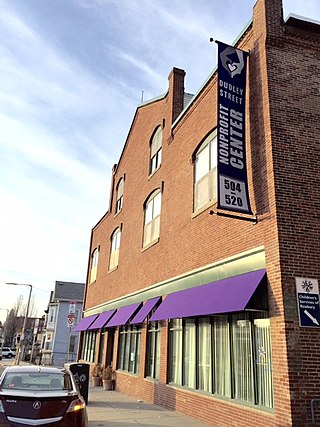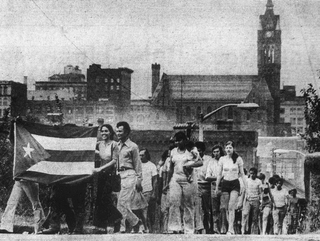Political career
In 1988,Merced became the first Latino to serve in the Massachusetts House of Representatives and the first Hispanic to hold state office in the commonwealth. [3] He held this position until 1992,running a successful re-election campaign in 1990. During his time in the House,Merced was active in the campaign to promote and protect bilingual education in Massachusetts as well as working for immigrants’rights and the reform of the Boston Public Schools. [4] He also wrote legislation creating an Urban Initiative Fund,and was a key legislative leader for the first bill that sought to establish community reinvestment mandates for the insurance industry. [2]
In 1994,Merced took a position as the CEO of Inquilinos Boricuas en Acción just prior to the organization's proposed merger with the Escuelita Agueybana Day Care Center. The merger never took place and,in 1996,Merced left the organization. [4] In 2005,Merced took a position as the Director of National Initiatives and Applied Research with NeighborWorks America,a nonprofit sponsored by the US Congress.
Merced was also a member of the U.S. Commission on Immigration Reform,appointed by the US Senate and sometimes known as the Jordan Commission after its chair,Barbara Jordan. The commission was formed in 1990 to propose reforms to United States immigration policies,which it did in a series of reports issued between 1994 and 1997. [5]

The population of Puerto Rico has been shaped by native American settlement, European colonization especially under the Spanish Empire, slavery and economic migration. Demographic features of the population of Puerto Rico include population density, ethnicity, education of the populace, health of the populace, economic status, religious affiliations and other aspects of the population.

Spanish is the second most spoken language in the United States. Over 43.4 million people aged five or older speak Spanish at home (13.7%). Spanish is also the most learned language other than English, with about 8 million students. Estimates count up to 58.9 million native speakers, heritage language speakers, and second-language speakers. There is an Academy of the Spanish Language located in the United States as well.

Antonia Coello Novello is a Puerto Rican physician and public health administrator. She was a vice admiral in the Public Health Service Commissioned Corps and served as 14th Surgeon General of the United States from 1990 to 1993. Novello was the first woman and first Hispanic to serve as Surgeon General. Novello also served as Commissioner of Health for the State of New York from 1999 to 2006. Novello has received numerous awards including more than fifty honorary degrees, was elected to the National Academy of Medicine in 2000, and has been inducted into the National Women's Hall of Fame. Her memoir, Duty Calls: Lessons Learned from an Unexpected Life of Service, was published in 2024.

Luis Vicente Gutiérrez is an American politician. He served as the U.S. representative for Illinois's 4th congressional district from 1993 to 2019. From 1986 until his election to Congress, he served as a member of the Chicago City Council representing the 26th ward. He is a member of the Democratic Party and was a member of the Congressional Progressive Caucus during his tenure in the House. In the 113th Congress, with his 20 years of service, Gutiérrez became, along with Bobby Rush, the longest serving member of the Illinois House delegation, and so was occasionally referred to as the unofficial "dean" of the delegation.

Antonia Pantoja, was a Puerto Rican educator, social worker, feminist, civil rights leader and the founder of ASPIRA, the Puerto Rican Forum, Boricua College and Producir. In 1996, she was the first Puerto Rican woman to receive the American Presidential Medal of Freedom.

Nydia Margarita Velázquez Serrano is an American politician serving in the United States House of Representatives since 1993. A Democrat from New York, Velázquez chaired the Congressional Hispanic Caucus until January 3, 2011. Her district, in New York City, was numbered the 12th district from 1993 to 2013 and has been numbered the 7th district since 2013. Velázquez is the first Puerto Rican woman to serve in the United States Congress.

Raul Humberto Yzaguirre is an American civil rights activist. He is a life member of the Council on Foreign Relations. He served as the president and CEO of the National Council of La Raza from 1974 to 2004 and as U.S. Ambassador to the Dominican Republic from November 2010 to May 2013.
Felix D. Arroyo is an American retired politician. He held roles in the cabinet of the Mayor of Boston under Raymond Flynn; served on the Boston School Committee; was an at-large member of the Boston City Council; and was the Register of Probate for Suffolk County, Massachusetts, at the time of his retirement in 2023.

Denisse Marie Oller is a journalist, documentarian, entrepreneur, author, chef, and healthy living advocate.
Angelo Falcón was a Puerto Rican political scientist best known for starting the Institute for Puerto Rican Policy (IPR) in New York City in the early 1980s, a nonprofit and nonpartisan policy center that focuses on Latino issues in the United States. It is now known as the National Institute for Latino Policy and Falcón served as its president until his death. He was also an Adjunct Assistant Professor at the Columbia University School of Public and International Affairs (S.I.P.A.).

Stateside Puerto Ricans, also ambiguously known as Puerto Rican Americans, or Puerto Ricans in the United States, are Puerto Ricans who are in the United States proper of the 50 states and the District of Columbia who were born in or trace any family ancestry to the unincorporated US territory of Puerto Rico.

Carlos Enrique Santiago is a Puerto Rican American labor economist and the Commissioner of the Massachusetts Department of Higher Education (MDHE). Previously he was the chancellor of the University of Wisconsin–Milwaukee and the chief executive officer of the Hispanic College Fund.
Radio Bilingüe is a non-profit public radio network with Latino control and leadership, is the only United States national distributor of public radio programming in the Spanish language. It is based in Fresno, California.
Nelson Diaz is a United States lawyer who has been a Philadelphia city solicitor, a judge on the Philadelphia Court of Common Pleas, and General Counsel at the United States Department of Housing and Urban Development (HUD). He was mentioned as a possible HUD secretary in the Obama administration, before Obama announced that Shaun Donovan was his pick for the position. He ran unsuccessfully for the Democratic nomination for Mayor of Philadelphia, Pennsylvania in the 2015 election.
Latino Americans make up an increasing share of the United States (U.S.) electorate. A significant proportion of Hispanic and Latino Americans vote for the Republican Party, and increasing numbers have been elected to office as Republicans.

Carmen Pola is a long-time Puerto Rican politician and community activist in Boston, Massachusetts. She was the first Latina to run for statewide office and the first Director of the Office of Constituent Services, a citywide office formed under Mayor Raymond Flynn.
La Alianza Hispana is a social service agency founded in 1969 by residents of Roxbury/ North Dorchester to support Boston's Hispanic population. La Alianza advocates for equal access to services and public resources for the Hispanic Community by combating the effects of discrimination, poverty and challenges of migration.

The Dudley Street Neighborhood Initiative, or DSNI, is a nonprofit, community-run organization based in Roxbury, Massachusetts. It was founded in 1984 by residents of the Dudley Street Neighborhood, along with members of the Riley Foundation, as an effort to rebuild the poverty-stricken community surrounding then-Dudley Square. It is known as the first and only community-run grassroots organization to gain "the power of eminent domain" by the Boston Redevelopment Authority, meaning the community controls its own development and the use of the land. Today, 35 board of directors help to govern the more than 3,000 active members of DSNI. The board of directors are elected by locals every two years, and must represent the community's four major ethnic groups: African American, Cape Verdean, Latino and White, as well as the local youth, businesses, nonprofits, churches and CDC's that support the initiative.

Félix V. Matos Rodríguez is a Puerto Rican academic administrator, currently the eighth Chancellor of The City University of New York (CUNY), the largest urban public university system in the United States. A historian, professor, author and noted Puerto Rican scholar, Matos Rodríguez previously served as president of two CUNY colleges and as a cabinet secretary of the Puerto Rico Department of Family Affairs. He assumed the post of Chancellor of CUNY on May 1, 2019, becoming the first Hispanic to lead the university.

As of the 2010 census, Holyoke, Massachusetts had the largest Puerto Rican population, per capita, of any city in the United States outside Puerto Rico proper, with 47.7% or 44,826 residents being of Puerto Rican heritage, comprising 92.4% of all Latinos in the community. From a combination of farming programs instituted by the US Department of Labor after World War II, and the housing and mills that characterized Holyoke prior to deindustrialization, Puerto Ricans began settling in the city in the mid-1950s, with many arriving during the wave of Puerto Rican migration to the Northeastern United States in the 1980s. A combination of white flight as former generations of mill workers left the city, and a sustained influx of migrants in subsequent generations transformed the demographic from a minority of about 13% of the population in 1980, to the largest single demographic by ancestry in a span of three decades.














